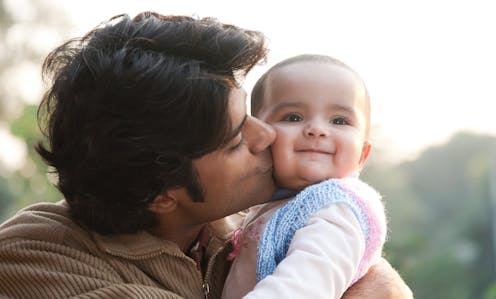
Have you ever heard of children’s attachment or attachment theory? If you are a parent, caregiver or an educator, chances are that it rings a bell. Children’s attachment refers to a strong emotional bond that children develop toward people who care for them.
A lot of research in recent decades highlights the importance of positive attachment — what scientists call a “secure attachment.”
Secure attachment acts like a superpower for children. When established, it can set the stage for positive outcomes, such as strong academic performance, learning, empathy, emotional regulation and well-being.
As a result, many parents and caregivers want their children to develop a secure attachment. But how can parents and caregivers achieve this?
In our recent study, a synthesis of 174 studies including more than 22,000 parents and children, we confirmed that when parents’ behaviour shows more sensitivity to children’s needs, their child is far more likely to develop secure attachment.
Table of Contents
Being present and attentive
As children grow, they face different situations where they need support from their parents. For example, infants may cry because they are hungry, be uncomfortable or feel scared because they heard a loud noise. Older children may scrape their knee falling off their bike or fear a monster in the closet.
A “sensitive” parent is someone who notices when their child needs attention and responds promptly in a way that comforts and reassures the child.
An “insensitive” parent may not notice that their child is in need, or may feel less interested in supporting them. This could happen for multiple reasons. Their attention may be drawn elsewhere: they may be preoccupied with work or personal issues or their phones; they may also have a history of being insensitively parented and lack the knowledge and skills to recognize and respond to their child’s cues effectively.
Being sensitive fosters trust and security
Our study, published in Psychological Bulletin, highlights how sensitive and responsive parenting behaviours are key ingredients to achieving secure attachment.
Importantly, this link was present for children of all ages, as well as for girls and boys.
This study tells us that sensitive behaviours show children that they can rely on their parent in moments of need and trust them to help, which fosters secure attachment.
Children’s sense of secure attachment with their parents or first caregivers is also the foundation for relationships with many other caregivers as children grow up, such as grandparents and educators. By having a caregiver who responds to their needs, children learn that when things get hard, they can rely on others for support and comfort.

(Shutterstock)
Many people may primarily think of mothers when it comes to comforting a distressed child. However, our study reiterates that sensitive parenting matters for mothers and fathers alike. Being able to recognize and respond to a child’s needs is about being attentive and caring for the child, and this can be achieved by any caregiver.
Strategies to be more sensitive
Given the importance of sensitive behaviours, parents, grandparents and/or educators may wonder how they can engage in more sensitively with children. Here are four strategies to help.
1) Recognize children’s signals
Try to watch children and pick up on their signals of interest or need. Children signal their needs differently based on their age. For example, babies cry, whimper or grimace to signal their needs. Babies also babble to show their interest in making sounds and to have those sounds be repeated back to them. Older children may cry, openly state their needs or refer to physical symptoms that may signal needs. It’s important to remember that all kids are different, and it may take some time and patience to recognize each child’s specific signals.
2) Respond to children’s signals
Once you recognize the child’s signals, it’s time to respond. It’s like playing a game of tennis — when a child cries or babbles, they are serving the ball. As the caregiver, your job is to watch that ball, and then respond by returning that serve back over the net. This back and forth exchange, often called “serve and return” interactions, fosters secure attachment and positive child development.
3) Respect children’s pace
It’s important to let the child take the lead. Allow the child set the pace and direction when you interact with them. For example, a small child might want to stop and inspect every rock or flower on a short walk, which might seem slow or dull to a parent, but is a fascinating adventure to a small child whose brain is rapidly developing. By letting children take the lead during play, encouraging their exploration and commenting on what they are interested in, you are helping them understand their world better.
Read more:
How caregivers can help build children’s emerging language skills
4) Be kind to yourself
Caregivers can sometimes experience pressure to be the “perfect parent.” However, it can sometimes be difficult to respond sensitively when we are feeling stressed or pulled in all directions. So, while we aim for consistency in our caregiving responses, it’s also important to be kind to ourselves and understand that we are human too.
Parenting is a learning journey. By engaging in sensitive caregiving, we are helping children feel safe, secure and loved. These experiences shape their trust and confidence in caregivers, others and the world around them, which can have lasting effects on their well-being.
![]()
Audrey-Ann Deneault receives funding from the Social Sciences and Humanities Research Council of Canada, the Canadian Institutes of Health Research, and the Centre de recherche universitaire sur les jeunes et les familles.
Sheri Madigan receives funding from the Social Sciences and Humanities Research Council, the Canadian Institutes of Health Research, the Alberta Children’s Hospital Foundation, an anonymous donor, and the Canada Research Chairs program.






















